Belenus: Mighty Gaulish God Of Light Often Associated With Lugh And Apollo
A. Sutherland - AncientPages.com - The Gaulish god Belenus (Belinus/Belenos), whose worship goes back to deep antiquity, was a widely recognized deity associated with healing, springtime festival, protection, and, on occasion, with the sun.
Continental god Belenus. Credit: Adobe Stock - Superhero DriGGa
His name is probably a Latinization of the god Beli worshiped by the Celts who inhabited the European continent before being driven away by the Romans.
"Great and powerful Belenus—
we honor you this day—
and thank you for your gifts.
You are known by many names.
You are the light over the crops in the fields,
the heat that warms the earth,
the hope that springs eternal,
the bringer of life..."
Related to Apollo But Not In Celtic Culture
In ancient depictions, this deity was recognized as the equivalent of the Roman god Apollo, a god of light and the sun, but sometimes associated with the god Lugh.
Belenus was often depicted riding the sun across the sky in a horse-drawn chariot. Other depictions show him riding a horse and throwing thunderbolts while using his wheel as a shield. A wheel and head with solar rays and halos are also associated with Belenus. The lines surrounding Belenus’s head could probably symbolize the warm, glowing rays of light coming from the sun god.
As we know, the god Apollo acquired power over medicine, healing, and disease after he was established at Delphi. In Celtic culture, however, Belenus was associated with health, fountains, health, and the pastoral lifestyle.
Credit: Hans Adam Weissenkircher - 1685 - Public Domain
His other associations were with the symbols of the phallic-shaped stone, the bull, the oak, and the horse. He was known as one of the Celtic high gods in Ireland, Scotland, Wales, France, Italy, Spain, England, and other locations. He had many names similar to Belen, Belinus, Bellinus, and Bel, depending on tradition, language, and place of worship.
His attributes included the capacity for healing, which earned him the award of being the god of medicine and a divine healer.
Due to his healing functions, he was worshiped as ‘the Master of Power’ or ‘the Powerful One’ at healing waters, including Aquae Borvonis (Bourbon-les-Bains) in France, and water sanctuaries, such as sacred springs at Sainte-Sabine, Burgundy, France.
In the areas conquered by the Roman Empire, he was identified with Apollo. This association was not due to solar imagery but rather healing capabilities.
In various records, Belenus also appears as a protective deity of livestock and crops and areas related to agricultural activities. In this ritual, both cattle and crops were purified to ensure prosperity for the following year. This protection ritual was held in honor of this deity.
Traces Of His Worship Found Mostly In Italy And France
Inscriptions dedicated to Belenus were found at many sites. He was worshiped among the Illyrians, in central and southern Gaul, in the eastern Alps, and in Aquileia (North Italy), where scholars identified as many as fifty-one of them. In the 3rd century, this god was the city's patron deity and the most popular divinity, according to Aelius Herodianus, one of the most celebrated grammarians of Greco-Roman antiquity. Herodianus in “The Roman Histories” equated Belenus with Apollo; however, it was only confirmed in a few inscriptions.
Herodianus in “The Roman Histories” equated Belenus with Apollo; however, it was only confirmed in a few inscriptions. Here, we see a vase dedicated to God Belenus exhibited at the Marseille history museum. Credit: Rvalette - CC BY-SA 4.0
Herodianus (Herodian) writes that the god Belenus appeared above a battlefield in Aquileia, Italy. The emperor Maximinus besieged the city in 238, but oracles testified that the city would be protected by Belenos, who was later attested to have been seen hovering over the soldiers. Aquileia was a very tough city; it was defended by the former consuls Crispinus and Menophilus, and it did withstand the siege, outlasting the emperor, who was assassinated within four months.
Another author, Iulius Capitolinus (300 AD -350 AD), referred to Belenus as Apollo or the Sun.
Traces of his worship in ancient times were found in other places in Europe as well. Most probably, early European settlers had their ritual site dedicated to Belenus at a site in New Hampshire called Mystery Hill, where a stone tablet with an Ogham inscription "Dedicated to Bel" on it was discovered in 1967 and translated by Dr. Barry Fell, president of the Epigraphic Society.
“The ancient author Apollonius relates a Celtic story of a stream formed by the tears of Apollo Belenus when he was forced from heaven by his father; as Apollo was the Greek sun divinity, this textual evidence strengthens the argument that Belenus had solar connections. In Britain, a hero Belinus was mentioned by the early historian Geoffrey of Monmouth as the twin to Brennius, the two went to war over the throne but ultimately agreed to share power.
The continental god Belinus is not described as warlike, so despite the similarity in names, it is unclear that the same figure is intended.” 1
Updated on March 23, 2024
Written by – A. Sutherland AncientPages.com Staff Writer
Copyright © AncientPages.com All rights reserved. This material may not be published, broadcast, rewritten or redistributed in whole or part without the express written permission of AncientPages.com
Expand for references- Patricia Monaghan- The Encyclopedia of Celtic Mythology and Folklore
- Scott Littleton, Gods, Goddesses, and Mythology, Volym 11
- Geoffrey of Monmouth, The History of the Kings of Britain
- Green, Miranda. Dictionary of Celtic Myth and Legend
More From Ancient Pages
-
 Scientists Closer To Solving The Mystery Of When Animals Evolved
Evolution | Jul 6, 2023
Scientists Closer To Solving The Mystery Of When Animals Evolved
Evolution | Jul 6, 2023 -
 Ancient Fossil Found In Sahara Suggests Loch Ness Monster Could Be Real
Archaeology | Jul 27, 2022
Ancient Fossil Found In Sahara Suggests Loch Ness Monster Could Be Real
Archaeology | Jul 27, 2022 -
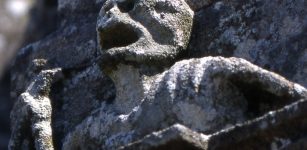 Ankou: Breton Angel Of Death That Delivers Souls To The Underworld
Featured Stories | Jul 18, 2021
Ankou: Breton Angel Of Death That Delivers Souls To The Underworld
Featured Stories | Jul 18, 2021 -
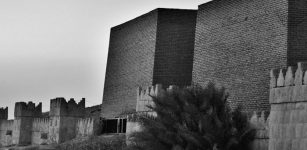 Biblical Jonah Visits Nineveh – The Evil City
Biblical Mysteries | Nov 9, 2018
Biblical Jonah Visits Nineveh – The Evil City
Biblical Mysteries | Nov 9, 2018 -
 First Early Roman Fortlet Found On The Isle of Anglesey, North Wales
Archaeology | Nov 26, 2015
First Early Roman Fortlet Found On The Isle of Anglesey, North Wales
Archaeology | Nov 26, 2015 -
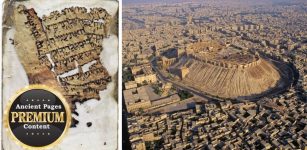 Unsolved Mystery Of The Aleppo Codex And Its Missing Pages: One Of The World’s Most Precious Ancient Books
Artifacts | Feb 27, 2017
Unsolved Mystery Of The Aleppo Codex And Its Missing Pages: One Of The World’s Most Precious Ancient Books
Artifacts | Feb 27, 2017 -
 Unusual Ancient Winged Half-Human And Half-Animal Divine Creature With Supernatural Powers
Artifacts | Jul 30, 2019
Unusual Ancient Winged Half-Human And Half-Animal Divine Creature With Supernatural Powers
Artifacts | Jul 30, 2019 -
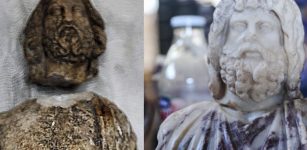 Statues Of Serapis Sky God And Asclepios God Of Medicine Unearthed In Ancient City Of Kibyra
Artifacts | Nov 26, 2020
Statues Of Serapis Sky God And Asclepios God Of Medicine Unearthed In Ancient City Of Kibyra
Artifacts | Nov 26, 2020 -
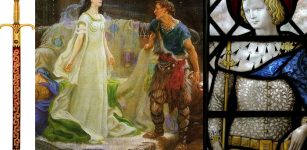 Curtana – Sword Of Mercy Once Belonged To The Anglo-Saxon King Edward The Confessor And Perhaps Even The Arthurian Hero Tristan
Artifacts | Jul 16, 2017
Curtana – Sword Of Mercy Once Belonged To The Anglo-Saxon King Edward The Confessor And Perhaps Even The Arthurian Hero Tristan
Artifacts | Jul 16, 2017 -
 Did Two Daughters Of Akhenaten Rule Together Under One Name Before Tutankhamun?
Archaeology | May 1, 2019
Did Two Daughters Of Akhenaten Rule Together Under One Name Before Tutankhamun?
Archaeology | May 1, 2019 -
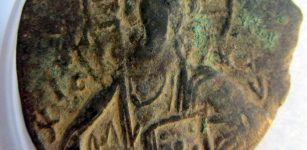 A 1,000-Year-Old Bronze Coin Accidentally Discovered By A Little Boy
Archaeology | Mar 12, 2020
A 1,000-Year-Old Bronze Coin Accidentally Discovered By A Little Boy
Archaeology | Mar 12, 2020 -
 Biblical Mysteries – Foods And Drinks That Gave Extraordinary Powers, Knowledge And Immortality
Biblical Mysteries | Mar 22, 2017
Biblical Mysteries – Foods And Drinks That Gave Extraordinary Powers, Knowledge And Immortality
Biblical Mysteries | Mar 22, 2017 -
 Bill Of Rights 1689 – Enormous Historical Moment In English History
Ancient History Facts | May 6, 2019
Bill Of Rights 1689 – Enormous Historical Moment In English History
Ancient History Facts | May 6, 2019 -
 Proteus: Prophetic Greek Sea God Who Knew All Things, Past, Present And Future
Featured Stories | Jan 17, 2020
Proteus: Prophetic Greek Sea God Who Knew All Things, Past, Present And Future
Featured Stories | Jan 17, 2020 -
 Mysterious Lost Kingdom Of Urartu And Its Enigmatic History
Featured Stories | Jun 22, 2014
Mysterious Lost Kingdom Of Urartu And Its Enigmatic History
Featured Stories | Jun 22, 2014 -
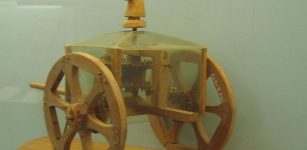 Remarkable South-Pointing Chariot – Ancient Cybernetic Machine Invented 1,700 Years Ago Is An Engineering Masterpiece
Ancient Technology | Jul 17, 2014
Remarkable South-Pointing Chariot – Ancient Cybernetic Machine Invented 1,700 Years Ago Is An Engineering Masterpiece
Ancient Technology | Jul 17, 2014 -
 Pre-Columbian Americans Mastered Electricity – Ancient Inscription And Document Reveal Proof Of Advanced Ancient Technology
Ancient Technology | Feb 4, 2018
Pre-Columbian Americans Mastered Electricity – Ancient Inscription And Document Reveal Proof Of Advanced Ancient Technology
Ancient Technology | Feb 4, 2018 -
 On This Day In History: William Penn – English Philosopher, Quaker And Founder Of Pennsylvania Was Born – Oct 14, 1644
News | Oct 14, 2016
On This Day In History: William Penn – English Philosopher, Quaker And Founder Of Pennsylvania Was Born – Oct 14, 1644
News | Oct 14, 2016 -
 Fascinating Ancient History Of Roman Shields
Featured Stories | Oct 1, 2018
Fascinating Ancient History Of Roman Shields
Featured Stories | Oct 1, 2018 -
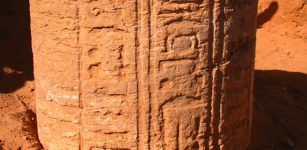 Abu Erteila’s Lost Temple And The Meroitic Empire: New Discoveries Shed Light On Nubian Civilization
Archaeology | Jan 14, 2016
Abu Erteila’s Lost Temple And The Meroitic Empire: New Discoveries Shed Light On Nubian Civilization
Archaeology | Jan 14, 2016



